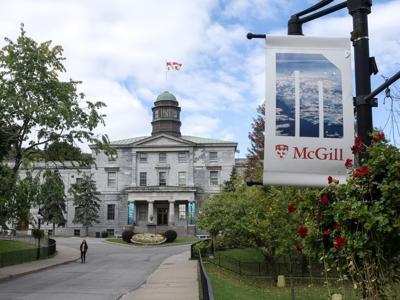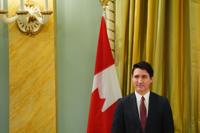MONTREAL - McGill University is threatening to cancel law school classes for the rest of the semester if it can't reach an agreement with a faculty union that has been on strike since August, but the union says it won't back down.
The university says it will drop its legal challenge of the faculty's right to unionize — one of the union's key demands — if the Association of McGill Professors of Law agrees to negotiate working conditions collectively with other unions at the school. However, the professors' association is calling the proposed deal a "non-offer," and says agreeing to end the strike will leave McGill holding all the cards.
The ultimatum is the latest development in a saga that has unfolded since law professors opted not to return to classrooms at the start of the fall semester, leaving students uncertain about what impact the strike could have on their academic future.
McGill's administration sent an email to law school students Monday morning saying the association must agree to end its strike by the end of the day or the university will cancel courses taught by union members as of Oct. 1.
"I’m aware … that the uncertainty around the semester is weighing heavily on many students, to the detriment of their well-being," McGill provost Christopher Manfredi wrote. "I would never have wanted us to reach this point. But … I cannot hold out as plausible that courses taught by (union) members could begin in the eighth, ninth, or tenth week of term and finish on time."
On Sunday, McGill sent the union an offer that included a promise to withdraw a judicial review of the union's certification "so long as progress is made, during the next five weeks, in good-faith negotiations towards a 'federated' system" that would see some working conditions established university-wide, instead of on a per-faculty basis, Manfredi said.
But Kirsten Anker, the union's vice-president, said in an interview that McGill is asking the law professors to go back to work without offering much in return. "The quid pro quo is we permanently give up our right to strike, while they get to eventually decide whether or not they want to drop the (judicial review)," she said. "We are not able to accept that."
Quebec's labour tribunal certified the law professors' union in November 2022, but the union has yet to secure its first collective agreement. The university had been planning to challenge the union's certification before the Quebec Superior Court in December.
The union, which includes more than 40 professors, has said faculty members won't return to classrooms until McGill drops that legal challenge. It's also demanding better pay and more involvement in the faculty's governance.
McGill's law faculty is the first group of professors to unionize at the university, though most non-faculty staff are unionized. Since the law faculty union was formed, professors in the departments of education and arts have also filed for union certification.
Anker said the union is open to having some parts of its collective agreement negotiated jointly with other faculty unions, but said the university needs to commit to dropping the judicial review immediately before law professors will agree to return to work.
The ongoing dispute has been "very confusing" for students who don't know what to expect from one day to the next, said a second-year law student who requested anonymity for fear of reprisal from the university. The student said she's taking one class, outside the law faculty, when her normal course load is five. She said that losing a full semester might mean she'll have to extend her degree, or she might give up working in the summer and take summer classes instead.
Still, the student said she directs her frustration toward McGill's administration — not the union. "I think the faculty union has a valid point. I think it's reasonable of them to want to unionize," she said. "I would be willing to have the semester be cancelled if it meant that the union is certified."
In a statement, the McGill Law Students' Association said the university's offer is "nothing more than smoke and mirrors" and said both sides need to be more flexible. "It has now become clear that McGill recklessly jeopardizes our semesters and the quality of our education in pursuit of its own interests," the statement said.
But the association also said the union has "made it clear … that they are willing to sacrifice the semester and that consideration of our interests is not pertinent to how the situation should be handled."
In his email, Manfredi said that if the semester is cancelled, McGill will try to ensure that students planning to graduate in December and register for bar school in January will still be able to do so. He also said the university will "work with students to minimize impacts on their financial aid."
Anker said there's no clear point at which the semester would become impossible to salvage. She said it would be feasible to extend part of this semester into the next one, so that the lost weeks are made up over a longer period.
"There are so many ways to deal with this," she said. "It's hard on our members. It's hard on the students. The university's intransigence is completely the source of this, but we believe in what we're doing, and we are going to stay strong and keep going until they see reason."
This report by Ďă¸ŰÁůşĎ˛ĘąŇĹĆ×ĘÁĎ was first published Sept. 30, 2024.






































